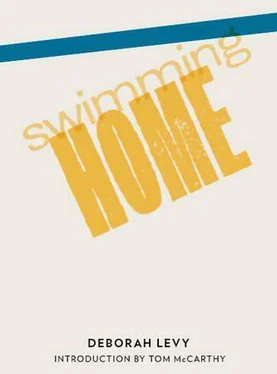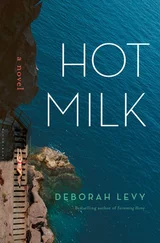Deborah Levy - Swimming Home
Здесь есть возможность читать онлайн «Deborah Levy - Swimming Home» весь текст электронной книги совершенно бесплатно (целиком полную версию без сокращений). В некоторых случаях можно слушать аудио, скачать через торрент в формате fb2 и присутствует краткое содержание. Год выпуска: 2011, Издательство: And Other Stories, Жанр: Современная проза, на английском языке. Описание произведения, (предисловие) а так же отзывы посетителей доступны на портале библиотеки ЛибКат.
- Название:Swimming Home
- Автор:
- Издательство:And Other Stories
- Жанр:
- Год:2011
- ISBN:нет данных
- Рейтинг книги:4 / 5. Голосов: 1
-
Избранное:Добавить в избранное
- Отзывы:
-
Ваша оценка:
- 80
- 1
- 2
- 3
- 4
- 5
Swimming Home: краткое содержание, описание и аннотация
Предлагаем к чтению аннотацию, описание, краткое содержание или предисловие (зависит от того, что написал сам автор книги «Swimming Home»). Если вы не нашли необходимую информацию о книге — напишите в комментариях, мы постараемся отыскать её.
Swimming Home
Swimming Home — читать онлайн бесплатно полную книгу (весь текст) целиком
Ниже представлен текст книги, разбитый по страницам. Система сохранения места последней прочитанной страницы, позволяет с удобством читать онлайн бесплатно книгу «Swimming Home», без необходимости каждый раз заново искать на чём Вы остановились. Поставьте закладку, и сможете в любой момент перейти на страницу, на которой закончили чтение.
Интервал:
Закладка:
‘But I want the port, Madame. I am looking for Dr Ortega.’
The blind Russian woman sounded indignant, as if she had been taken to the wrong place against her will. Isabel gazed at the names of residents carved on to brass plaques by the door and read them out loud: ‘Perez, Orsi, Bergel, Dr Ortega.’ There was his name. This was where he lived, even though the woman disagreed.
She pressed the bell for Dr Ortega and ignored the Russian woman, who was now fumbling urgently in her crocodile-skin handbag for what turned out to be a grubby portable dictionary.
The voice that came out of the polished brass speaker of the door entry system was a soft Spanish voice asking her, in French, to say who she was.
‘My name is Isabel. Your visitor is waiting for you downstairs.’
A police siren drowned her out and she had to start again.
‘Did you say your name is Isabel?’ It was a simple enough question but it made her anxious, as if she was indeed pretending to be someone she was not.
The entry system made a whining sound and she pushed open the glass door framed in heavy dark wood that led into the marble foyer. The Russian woman in her stained dark glasses did not want to move and instead kept repeating her request to be taken to the port.
‘Are you still there, Isabel?’
Why did the doctor not walk down the stairs and collect the blind woman himself?
‘Could you come down and get your patient?’ She heard him laugh.
‘Señora, soy doctor en filosofía . She is not my patient. She is my student.’
He was laughing again. The dark rumbling laugh of a smoker. She heard his voice through the holes in the speaker and moved closer to it.
‘My student wants the port because she wishes to go back to St Petersburg. She does not want to arrive for her Spanish lesson and therefore does not believe she is here. Ella no quiere estar aquí .’
He was playful and flirtatious, a man who had time to speak in riddles from the safety of the door entry system. She wished she could be more like him and fool around and play with whatever the day brought in. What had led her to where she was now? Where was she now? As usual she was running away from Jozef. This thought made her eyes sting with tears she resented. No, not again, not Jozef, not again. She turned away and left the Russian woman groping the banisters of the marble stairway, still insisting she was in the wrong place and the port was her final destination.
The sky had darkened and she could smell the sea somewhere close. Seagulls screeched above her head. The sweet yeasty smell of the boulangerie across the road wafted over the parked cars. Families were returning from the beach carrying plastic balls and chairs and colourful towels. The boulangerie was suddenly full of teenage boys buying slices of pizza. Across the road the mechanic was revving his motorbike triumphantly. She was not ready to go home and start imitating someone she used to be. Instead she walked for what seemed like an hour along the Promenade des Anglais and stopped at one of the restaurants set up on the beach near the airport.
The planes taking off flew low over the black sea. A party of students was drinking beer on the slopes of the pebbles. They were opinionated, flirtatious, shouting at each other, enjoying a summer night on the city beach. Things were starting in their lives. New jobs. New ideas. New friendships. New love affairs. She was in the middle of her life, she was nearly fifty years old and had witnessed countless massacres and conflicts in the work that pressed her up close to the suffering world. She had not been posted to cover the genocide in Rwanda, as two of her shattered colleagues had been. They had told her it was impossible to believe the scale of the human demolition, their own eyes dazed as they took in the dazed eyes of the orphans. Starved dogs had become accustomed to eating human flesh. They had seen dogs roam the fields with bits of people between their teeth. Yet even without witnessing first-hand the terrors of Rwanda, she had gone too far into the unhappiness of the world to start all over again. If she could choose to unlearn everything that was supposed to have made her wise, she would start all over again. Ignorant and hopeful, she would marry all over again and have a child all over again and drink beer with her handsome young husband on this city beach at night. They would be enchanted beginners all over again, kissing under the bright stars. That was the best thing to be in life.
A large extended family of women and their children sat at three tables pushed together. They all had the same wiry brown hair and high cheekbones and they were eating elaborate swirls of ice cream piled into pint-sized glasses. The waiter lit the sparklers he had stuck into the chantilly and they oohed and aahed and clapped their hands. She was cold in her halter-neck dress, too naked for this time of night. The women feeding their children with long silver teaspoons glanced curiously at the silent brooding woman with bare shoulders. Like the waiter, they seemed offended by her solitude. She had to tell him twice she was not expecting anyone to join her. When he slammed her espresso on the empty table set for two, most of it spilled into the saucer.
She watched the waves crash on the pebbles. The ocean folding into itself the plastic bags left on the beach that day. While she tried to make what was left of her coffee last long enough to earn her place at a table set for two, the thoughts she tried to push away kept returning like the waves on the stones.
She was a kind of ghost in her London home. When she returned to it from various war zones and found that in her absence the shoe polish or light bulbs had been put in a different place, somewhere similar but not quite where they were before, she learned that she too had a transient place in the family home. To do the things she had chosen to do in the world, she risked forfeiting her place as a wife and mother, a bewildering place haunted by all that had been imagined for her if she chose to sit in it. She had attempted to be someone she didn’t really understand. A powerful but fragile female character. If she knew that to be forceful was not the same as being powerful and to be gentle was not the same as being fragile, she did not know how to use this knowledge in her own life or what it added up to, or even how it made sitting alone at a table laid for two on a Saturday night feel better. When she arrived in London from Africa or Ireland or Kuwait it was Laura who sometimes offered her a bed in the storeroom above their shop in Euston. It was a kind of convalescence. She lay on it in the daytime and Laura brought her cups of tea when the shop was quiet. They had nothing in common except they had known each other for a long time. The time that had passed between them counted for something. They did not have to explain anything or be polite or fill in the gaps in conversation.
She invited Laura to share the villa with them for the summer and was surprised at how quickly her friend accepted. Laura and Mitchell usually needed more notice to shut up the shop and get their affairs in order.
The sparklers were spluttering to an end in the ice creams. One of the mothers suddenly shouted at her five-year-old son, who had dropped his glass on the floor. It was a cry of incandescent rage. Isabel could see she was exhausted. The woman had become fierce, neither unhappy nor happy. She was now on her hands and knees, wiping the ice cream on the floor with the napkins the clan were holding out to her. She felt the disapproval of the women staring at her as she sat alone, but she was grateful to them. She would bring Nina to this restaurant and buy her daughter an ice cream with a sparkler in it. The women had planned something lovely for their children, something she would imitate.
Читать дальшеИнтервал:
Закладка:
Похожие книги на «Swimming Home»
Представляем Вашему вниманию похожие книги на «Swimming Home» списком для выбора. Мы отобрали схожую по названию и смыслу литературу в надежде предоставить читателям больше вариантов отыскать новые, интересные, ещё непрочитанные произведения.
Обсуждение, отзывы о книге «Swimming Home» и просто собственные мнения читателей. Оставьте ваши комментарии, напишите, что Вы думаете о произведении, его смысле или главных героях. Укажите что конкретно понравилось, а что нет, и почему Вы так считаете.












